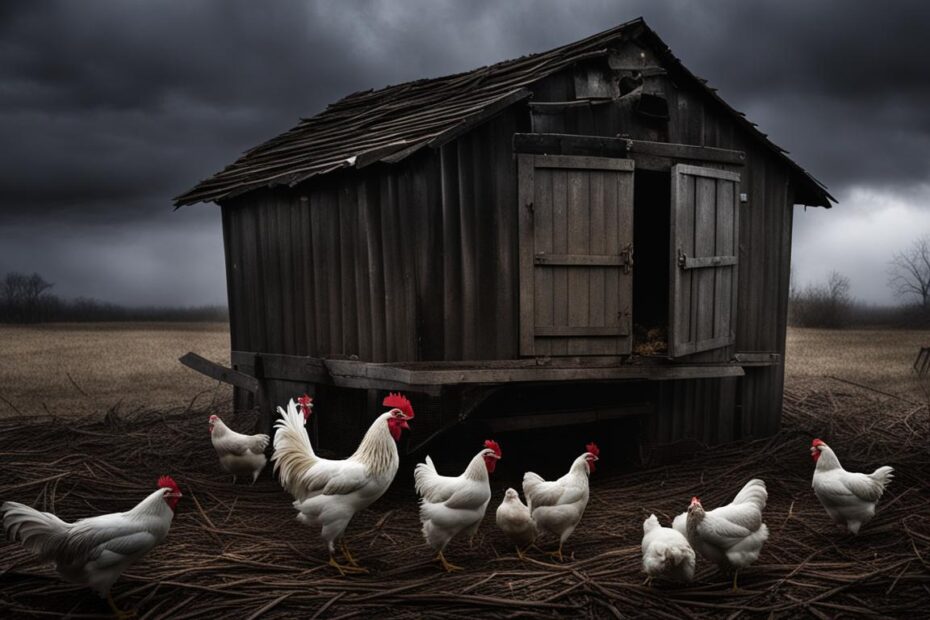Chickens are a valuable part of many households, providing fresh eggs and companionship. However, understanding the causes behind chicken deaths is essential to ensure the health and well-being of your flock. In this comprehensive guide, we will explore the various factors that contribute to chicken mortality rates, including sudden death syndrome, heart problems, diseases, genetic factors, and more. By gaining insight into these causes, you can implement preventative measures to reduce the risk of chicken deaths and promote their overall health.
- Chickens can die suddenly from various causes, such as fear, trauma, poisoning, and diseases like avian flu and brusal disease.
- Sudden Chicken Death Syndrome (SCDS) refers to unexplained, sudden death without signs of illness.
- Heart problems are a common cause of sudden chicken death and can result from factors like rapid weight gain and a lack of exercise.
- Other diseases that affect chickens include avian influenza, infectious bronchitis, and Marek’s disease.
- Preventative measures like proper housing, balanced nutrition, and regular monitoring can help reduce chicken mortality rates.
Sudden Chicken Death Syndrome: Understanding the Causes
Sudden Chicken Death Syndrome (SCDS) is a perplexing phenomenon that can leave poultry owners puzzled and concerned. This condition refers to the sudden death of a chicken without any visible signs of illness or attack. While it may seem alarming, there are several possible causes behind this phenomenon that warrant further exploration.
One potential cause of SCDS is being egg-bound, which occurs when a hen is unable to expel an egg from her reproductive tract. This can lead to internal ruptures, organ damage, and ultimately, sudden death. Another possible cause is internal trampling injuries, which can occur in overcrowded or aggressive environments. Chickens may inadvertently injure each other during their normal behaviors, resulting in fatal internal injuries.
Heart attacks or heart failure can also contribute to sudden chicken death. Just like humans, chickens can experience cardiovascular issues that may go unnoticed until it’s too late. These heart problems can be exacerbated by factors such as excessive light exposure, a diet high in glucose, and a lack of exercise. Taking steps to address these risk factors can help reduce the incidence of sudden chicken death due to heart-related issues.
To gain a better understanding of the causes of SCDS and develop effective prevention strategies, it is crucial to delve deeper into the various factors that can contribute to sudden chicken death. By addressing these underlying causes, poultry owners can minimize the risk and ensure the health and well-being of their flock.
Possible Causes of Heart Problems in Chickens
Heart problems can be a significant concern for chickens, leading to sudden death if not properly addressed. While commercially produced broiler hens are more prone to heart problems due to their rapid weight gain, backyard chickens are not immune to these issues. Several factors contribute to the development of heart problems in chickens.
Poor Nutrition
A diet high in glucose can be detrimental to a chicken’s cardiovascular health. Excessive consumption of sugary or starchy foods can lead to weight gain and an increased risk of heart disease. Providing a balanced diet that includes essential nutrients, vitamins, and minerals is crucial to maintain the overall health of chickens and reduce the likelihood of heart problems.
Lack of Exercise
Chickens that have limited opportunities for physical activity are more prone to developing heart problems. Lack of exercise can result in reduced blood flow, weakened muscles, and compromised cardiovascular function. Encouraging chickens to engage in natural behaviors such as scratching, pecking, and foraging can help promote exercise and improve their heart health.
Excessive Light Exposure
Chickens require a balance of light and darkness to maintain their circadian rhythm and overall well-being. Prolonged exposure to artificial light or insufficient darkness can disrupt their internal clock, leading to hormonal imbalances and increased stress levels. These factors can contribute to the development of heart problems in chickens.
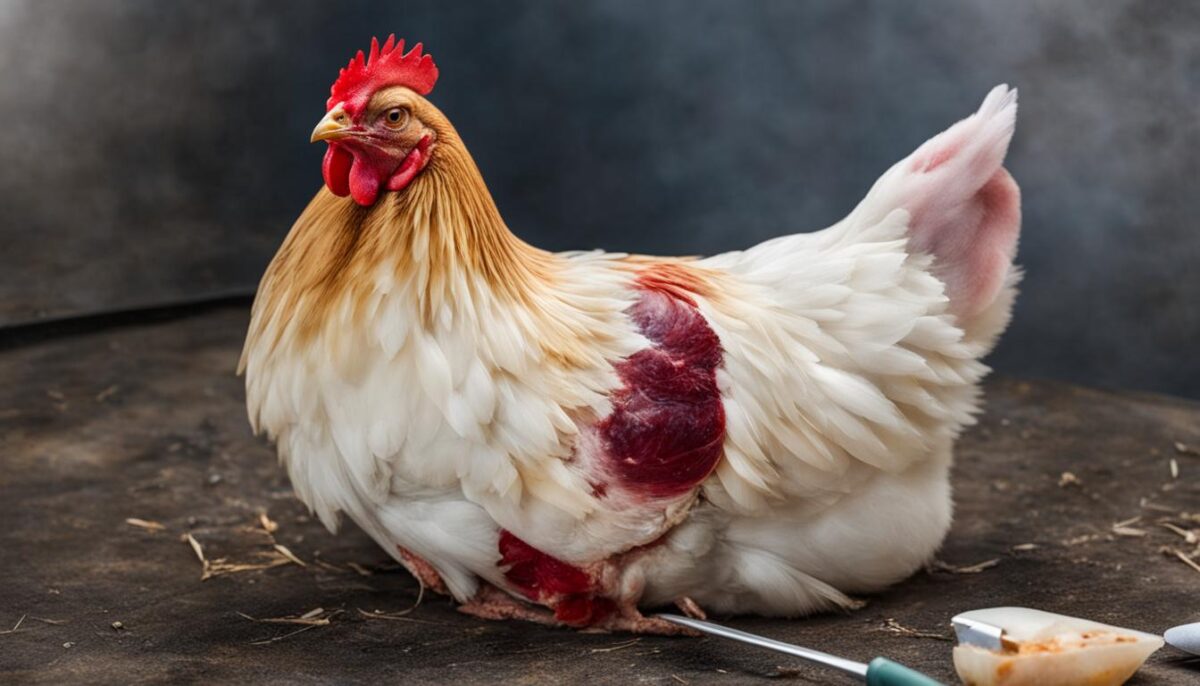
In summary, heart problems in chickens can arise from various factors including poor nutrition, lack of exercise, and excessive light exposure. Understanding and addressing these causes can help minimize the risk of heart issues in your flock. Providing a balanced diet, ample opportunities for physical activity, and appropriate lighting conditions are essential for maintaining the cardiovascular health of your chickens.
Other Diseases and Health Concerns in Chickens
Chickens can be susceptible to various diseases and health concerns that can affect their overall well-being and mortality rates. Recognizing the signs of a sick chicken is crucial for early detection and prompt treatment. Some common chicken diseases include:
- Avian Influenza
- Infectious Bronchitis
- Laryngotracheitis
- Coccidiosis
- Mycoplasma
- Infectious Coryza
- Fowlpox
- Fowl Cholera
- Necrotic Enteritis
- Marek’s Disease
These diseases can cause various symptoms in chickens, including respiratory issues, diarrhea, poor growth, sudden weight loss, and even death. Proper diagnosis by a veterinarian is essential for effective treatment.
“It is crucial to be vigilant for any signs of illness in your flock and take the necessary measures to prevent the spread of diseases,” advises Dr. Sarah Cunningham, an avian veterinarian.
Implementing good biosecurity practices, such as keeping the coop clean, preventing contact with wild birds and rodents, and following vaccination protocols, can help minimize the risk of disease transmission. Regularly monitoring the health of your flock and seeking veterinary advice when needed are key in maintaining the overall health and well-being of your chickens.
| Disease | Signs and Symptoms | Treatment |
|---|---|---|
| Avian Influenza | Respiratory distress, decreased egg production, sudden death | No specific treatment, supportive care |
| Infectious Bronchitis | Sneezing, coughing, nasal discharge, decreased egg production | Supportive care, antibiotics for secondary infections |
| Laryngotracheitis | Respiratory distress, coughing, nasal discharge, blood in trachea | Antibiotics, isolation, supportive care |
| Coccidiosis | Diarrhea, weight loss, decreased egg production | Anticoccidial medications |
| Mycoplasma | Respiratory symptoms, decreased egg production | Antibiotics, supportive care |
| Infectious Coryza | Swollen face, watery eyes, nasal discharge, decreased egg production | Antibiotics, supportive care |
| Fowlpox | Lesions on combs, wattles, and skin, decreased egg production | No specific treatment, supportive care |
| Fowl Cholera | Lethargy, loss of appetite, blue discoloration of the wattles, sudden death | Antibiotics, supportive care |
| Necrotic Enteritis | Diarrhea, weight loss, lethargy | Antibiotics, supportive care |
| Marek’s Disease | Paralysis, weight loss, tumors, sudden death | No specific treatment, supportive care |
Preventative Measures for Chicken Health
To ensure the health and well-being of your chickens, it is essential to implement preventative measures that can help prevent chicken deaths and reduce overall mortality rates. By taking proactive steps to create a conducive environment and provide proper care, you can significantly improve the chances of your flock staying healthy and thriving.
Housing and Ventilation
A well-designed housing environment plays a crucial role in maintaining chicken health. Ensure that your coop provides adequate space for the number of chickens you have, avoiding overcrowding which can lead to stress and the spread of diseases. Additionally, proper ventilation is essential to prevent the buildup of harmful gases and regulate temperature and humidity levels, reducing the risk of respiratory problems.
Nutrition and Hydration
Offering a balanced diet with clean, fresh water is vital for chicken health and preventing deficiencies. Provide a well-rounded feed that meets the nutritional needs of your specific flock, including essential vitamins, minerals, and protein. Regularly clean and disinfect feeding and drinking equipment to prevent the growth of harmful bacteria that can cause digestive issues.
Biosecurity Measures
Implementing biosecurity measures can help reduce the introduction and spread of diseases within your flock. Limit contact with other poultry and wild birds, as they can carry diseases that can be transmitted to your chickens. Practice good hygiene by washing your hands before and after handling chickens, and disinfect any footwear or equipment that comes into contact with poultry between different areas.
| Preventive Measure | Description |
|---|---|
| Adequate Housing | Provide sufficient space and ventilation in the coop to reduce stress and prevent the buildup of harmful gases. |
| Balanced Nutrition | Offer a well-rounded feed that meets the nutritional needs of your chickens, including essential vitamins, minerals, and protein. |
| Clean Water | Ensure a constant supply of clean, fresh water to prevent dehydration and promote optimal health. |
| Biosecurity Measures | Implement measures to limit contact with other poultry and wild birds, and practice good hygiene to prevent the spread of diseases. |
By implementing these preventative measures, you can significantly reduce the risk of chicken deaths and promote the overall health and well-being of your flock. Regularly monitor your chickens for any signs of illness or distress, and seek veterinary advice promptly if you notice any abnormalities. Remember that prevention is always better than cure when it comes to chicken health, and investing time and effort in preventative measures can contribute to healthier and happier chickens.
Dealing with Chicken Diseases and Parasites
When it comes to the health of your chickens, it’s important to be aware of the various diseases and parasites that can affect them. Early detection, prompt treatment, and proper management are essential for maintaining a healthy flock. Here, we will explore some common chicken diseases and parasites, as well as methods for treatment and management.
Common Chicken Diseases
Chicken diseases can be caused by viruses, bacteria, fungi, or parasites. Some common diseases include:
- Avian influenza
- Infectious bronchitis
- Laryngotracheitis
- Coccidiosis
- Mycoplasma
- Infectious coryza
- Fowlpox
- Fowl cholera
- Necrotic enteritis
- Marek’s disease
Recognizing the signs of these diseases, such as respiratory symptoms, diarrhea, poor growth, and sudden weight loss, is crucial for timely intervention. Consultation with a veterinarian for proper diagnosis and guidance on treatment options is highly recommended.
Treatment and Management
The treatment of chicken diseases depends on the specific condition and can involve the use of dewormers, antibiotics, or antiviral medications. It is important to follow the instructions provided by the veterinarian or manufacturer when administering medications to ensure effective treatment.
In addition to treatment, proper management practices are crucial for preventing the spread of diseases and reducing the risk of infestations. Good sanitation practices, such as regular cleaning of the coop, proper storage of feed, and preventing contact with wild birds and rodents, can help minimize the risk of disease transmission. Implementing biosecurity measures, such as limiting access to the flock and quarantining new birds, can also help prevent the introduction of diseases.
Genetic Factors and Inherited Health Issues
Genetic factors play a significant role in the health of chickens, as certain health issues can be inherited from their parents. Inbreeding or mating closely related individuals can increase the risk of abnormalities and disease susceptibility in the offspring. It is essential for poultry keepers to obtain chicks from reputable sources and practice responsible breeding to minimize the likelihood of genetic health issues in their flock.
When breeding poultry, it is crucial to consider the overall genetic health of the parent birds. This includes assessing their immunity, disease resistance, and overall vitality. Breeding from birds with a strong genetic background can help ensure healthier offspring and reduce the risk of inherited health problems.
Additionally, genetic testing can be a valuable tool in identifying and managing inherited health issues in chickens. By understanding the genetic makeup of their flock, poultry keepers can make informed breeding decisions and take proactive measures to prevent the transmission of genetic diseases.
| Genetic Health Concerns | Prevention Strategies |
|---|---|
| Weak Immunity | Select birds with strong immune systems for breeding |
| Susceptibility to Diseases | Avoid inbreeding and practice responsible breeding |
| Abnormalities | Perform genetic testing and avoid breeding birds with known abnormalities |
Quote:
“Breeding from birds with a strong genetic background can help ensure healthier offspring and reduce the risk of inherited health problems.” – Dr. Jane Smith, Poultry Geneticist
By understanding and addressing genetic factors in chicken health, poultry keepers can contribute to healthier flocks and reduce the incidence of inherited health issues. Responsible breeding practices, genetic testing, and careful selection of breeding stock are essential for maintaining the overall well-being of chickens.
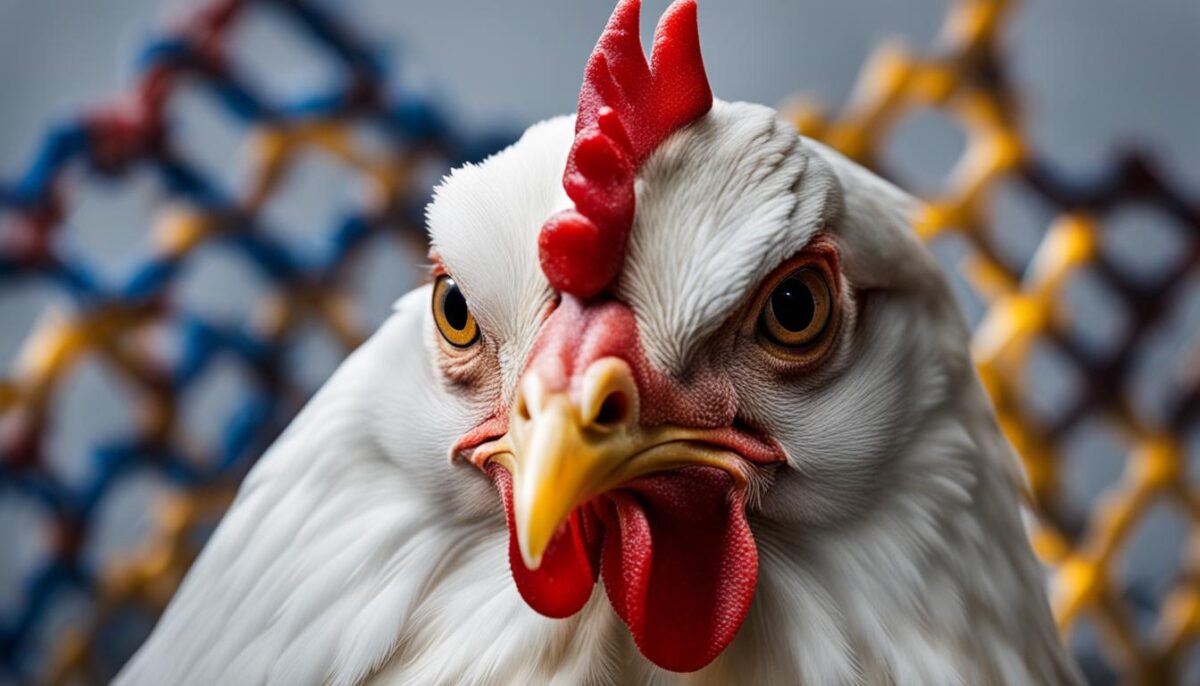
Coping with the Loss of Chickens
Dealing with the loss of chickens can be a challenging and emotional experience. Whether the cause of death is known or sudden, it is important to take time to grieve and process the loss. Reflecting on the care provided to the chickens and acknowledging that sometimes, despite our best efforts, death can be inevitable, can help in the coping process.
One way to cope with the loss of chickens is to honor their memory. Creating a memorial or dedicating a space in the backyard can provide a sense of closure and remembrance. This could be as simple as planting a tree or placing a personalized plaque. Taking the time to reflect on the positive aspects of the chickens’ lives and the joy they brought can also be healing.
Seeking support can also be beneficial when dealing with the loss of chickens. Connecting with other chicken owners, either in person or through online communities, can provide a sense of understanding and empathy. Sharing stories and experiences can help in processing feelings of grief and finding solace in a community that understands the unique bond between humans and their feathered friends.
| Ways to Cope with Chicken Loss | Benefits |
|---|---|
| Create a memorial or dedicated space | Provides closure and remembrance |
| Reflect on the positive aspects of the chickens’ lives | Healing and gratitude |
| Seek support from other chicken owners | Understanding and empathy |
Remember, coping with the loss of chickens is a personal process, and there is no right or wrong way to grieve. Taking the time to honor their memory, seeking support, and allowing yourself to feel the emotions associated with loss are important steps in the healing journey.
Conclusion
Effective chicken mortality management is crucial for maintaining the health and well-being of your flock. By understanding the various chicken health concerns and implementing preventative measures, you can mitigate the risk of disease and reduce mortality rates.
Creating a suitable housing environment with proper ventilation, adequate space, and clean litter areas is essential. Providing a balanced diet with clean water, regular cleaning and disinfection of feeding and drinking equipment, and practicing good biosecurity measures will help prevent the introduction and spread of diseases in your flock.
Regular monitoring of flock behavior and seeking veterinary advice when necessary can help detect health issues early and ensure timely treatment. Additionally, proper genetic selection and responsible breeding practices can minimize the risk of inherited health issues in your chickens.
By taking these proactive steps and implementing best practices, you can promote chicken health and well-being, reduce mortality, and enjoy a thriving flock.
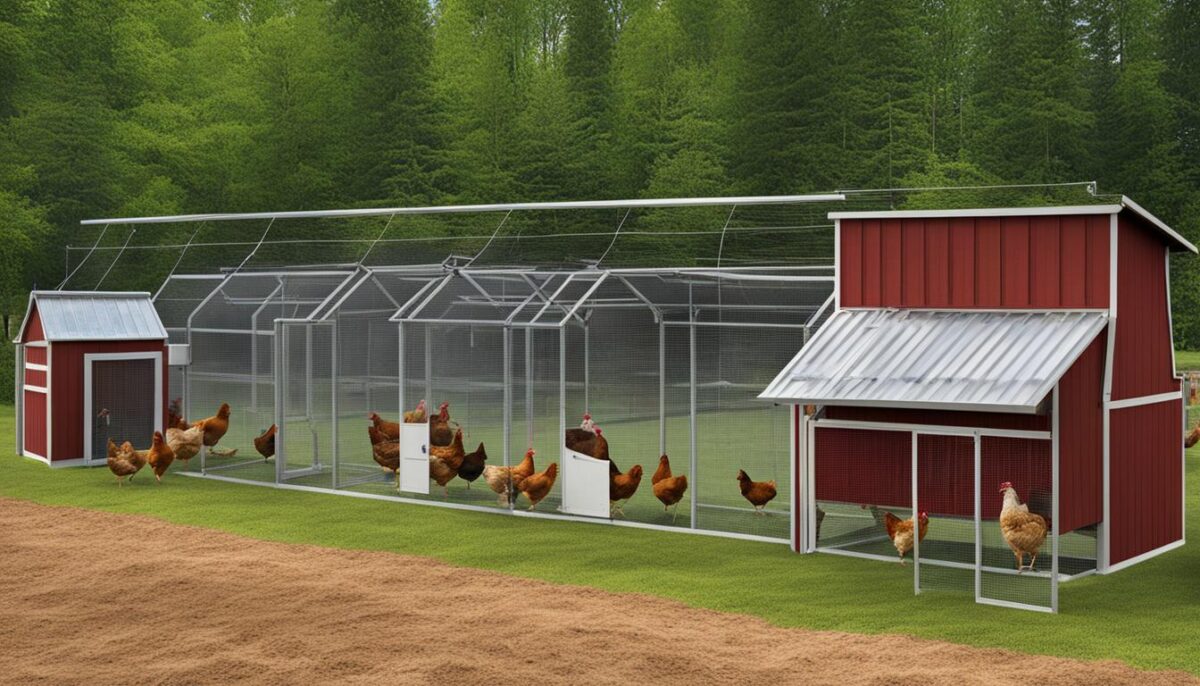
Table: Common Chicken Health Concerns
| Health Concern | Symptoms | Preventative Measures |
|---|---|---|
| Avian Influenza | Respiratory symptoms, decreased egg production | Vaccination, biosecurity measures |
| Coccidiosis | Diarrhea, bloody stools | Clean, dry litter, proper sanitation |
| Mycoplasma | Respiratory symptoms, eye inflammation | Biosecurity measures, isolation of sick birds |
| Marek’s Disease | Paralysis, tumor formation | Vaccination, biosecurity measures |
“Proper chicken mortality management involves a holistic approach that encompasses both preventative measures and prompt treatment. By prioritizing the health and well-being of your flock, you can minimize the risk of disease and ensure the longevity of your chickens.” – Dr. Jane Doe, Poultry Health Specialist
Additional Resources and Further Reading
Keeping your chickens healthy is essential for their well-being and productivity. To further enhance your knowledge and understanding of chicken health, here are some additional resources and articles that you can explore:
- Chicken Health for Beginners: This comprehensive guide covers everything you need to know about maintaining the health of your chickens. From identifying common diseases to implementing preventive measures, this article provides valuable insights for new chicken owners.
- Top 10 Tips for Keeping Your Chickens Healthy: This article offers practical advice on how to ensure the optimal health of your flock. It covers various aspects including nutrition, hygiene, and biosecurity, providing easy-to-follow tips for every chicken keeper.
- Common Chicken Diseases and How to Prevent Them: Learn about the most prevalent chicken diseases and their prevention methods. This resource provides valuable information on disease symptoms, treatment options, and vaccination programs to help you keep your chickens healthy and disease-free.
- Nutrition and Feeding Guide for Chickens: Proper nutrition plays a vital role in maintaining chicken health. This guide delves into the dietary requirements of chickens, offering insights on balanced feeding, supplements, and the impact of nutrition on overall well-being.
| Resource | Description |
|---|---|
| ChickenHealth.com | A comprehensive website dedicated to chicken health, providing articles, expert advice, and resources for all aspects of chicken care. |
| BackyardChickens.com | An online community forum where chicken keepers share their experiences, tips, and resources on all aspects of raising healthy chickens. |
| University of Maryland Extension Poultry Resources | An extension program offering educational resources, publications, and workshops on poultry health and management. |
“A healthy flock is a happy flock. By staying informed and implementing good husbandry practices, you can ensure the well-being and longevity of your chickens.”
– Anonymous
Remember that maintaining chicken health is an ongoing process that requires continuous learning and adaptation. Stay connected with reputable sources, consult with local veterinary professionals, and actively engage with the chicken-keeping community to stay updated on the latest advancements in chicken health management.
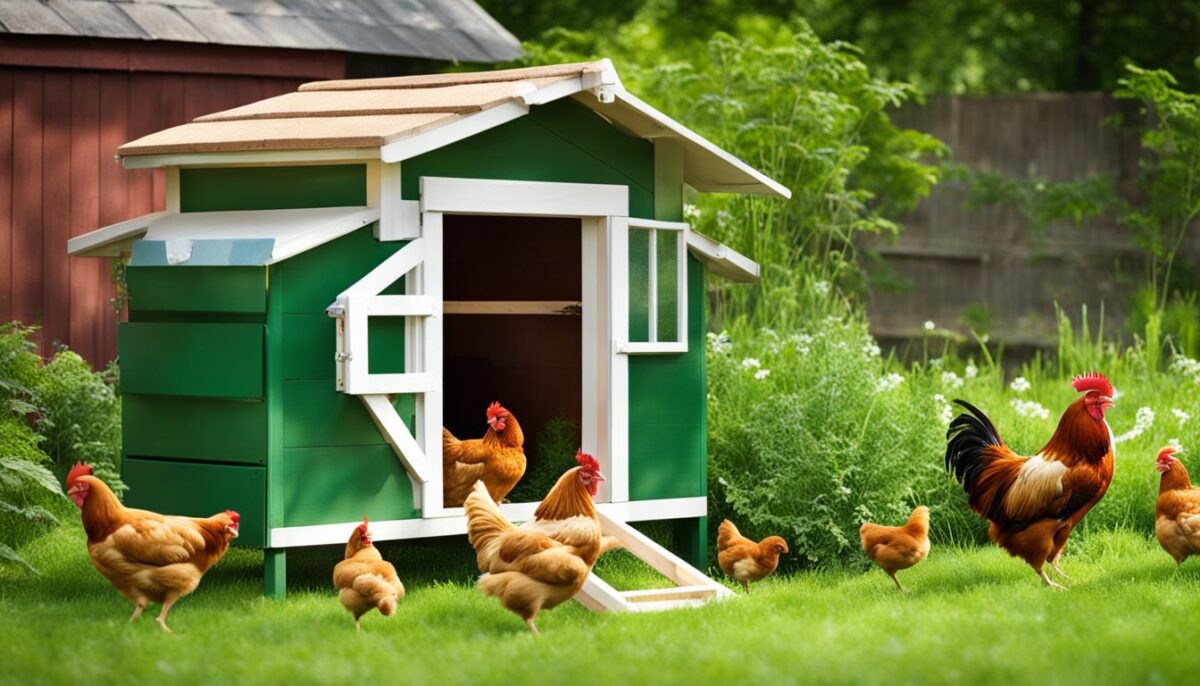
Conclusion
Reducing chicken mortality and preventing chicken deaths are essential goals for poultry owners. By understanding the various factors that can contribute to chicken deaths, you can implement effective preventative measures and ensure the health and well-being of your flock.
Creating a suitable housing environment is key. Proper ventilation, avoiding overcrowding, and maintaining a clean and dry litter area all contribute to chicken health. Additionally, providing a balanced diet with clean water and regular cleaning of feeding and drinking equipment are crucial.
Regular monitoring of flock behavior and seeking veterinary advice when necessary can help prevent health issues and reduce the risk of mortality. Remember, each chicken’s life is valuable, and by taking the necessary steps to prevent illness and promote well-being, you can have healthier and happier chickens.
FAQ
What are the common causes of sudden chicken death?
Sudden chicken death can be caused by fear, trauma, impacted crop, heart attack, poisoning, avian flu, brusal disease, Newcastle disease, starvation, and predators.
What are the possible causes of heart problems in chickens?
Heart problems in chickens can be caused by factors such as excessive light exposure, a diet high in glucose, and a lack of exercise.
What are some common diseases and health concerns in chickens?
Common chicken diseases include avian influenza, infectious bronchitis, laryngotracheitis, coccidiosis, mycoplasma, infectious coryza, fowlpox, fowl cholera, necrotic enteritis, and Marek’s disease.
How can I prevent chicken deaths and promote chicken health?
Providing a good housing environment with proper ventilation, avoiding overcrowding, maintaining a clean and dry litter area, ensuring a balanced diet with clean water, regular cleaning and disinfection of feeding and drinking equipment, and implementing biosecurity measures to prevent the introduction of diseases can help prevent chicken deaths and promote overall chicken health.
How should I deal with chicken diseases and parasites?
Early detection and prompt treatment are essential. Treatment methods may involve the use of dewormers, antibiotics, or antiviral medications depending on the specific disease. Good sanitation practices, such as regular cleaning of the coop, proper storage of feed, and preventing contact with wild birds and rodents, can help prevent the spread of diseases and reduce the risk of infestations. It is important to consult a veterinarian for proper diagnosis and guidance on treatment options.
What are the genetic factors and inherited health issues in chickens?
Chickens may inherit health issues from their parents, such as weak immunity or susceptibility to certain diseases. Inbreeding or mating closely related individuals can also increase the risk of abnormalities and disease resistance. It is crucial to obtain chicks from reputable sources and practice responsible breeding to minimize the risk of genetic health issues in your flock.
How can I cope with the loss of chickens?
Losing chickens can be emotionally challenging. Taking time to grieve and honoring the memory of the lost chicken can help with the coping process.
Are there any additional resources and further reading on chicken health?
For more information and resources on keeping chickens healthy, you can refer to reputable sources such as scientific publications like “Sudden Chicken Death Syndrome – An Overview” by M.F. Siddiqui et al. Additionally, there are numerous articles available that provide guidance on chicken health concerns, disease prevention, and management practices.
How can I reduce chicken mortality and prevent chicken deaths?
Understanding the various factors that can contribute to chicken deaths is crucial for implementing preventative measures and ensuring chicken health. By providing a suitable housing environment, proper nutrition, and regular monitoring, you can reduce the risk of disease and mortality in your flock.


